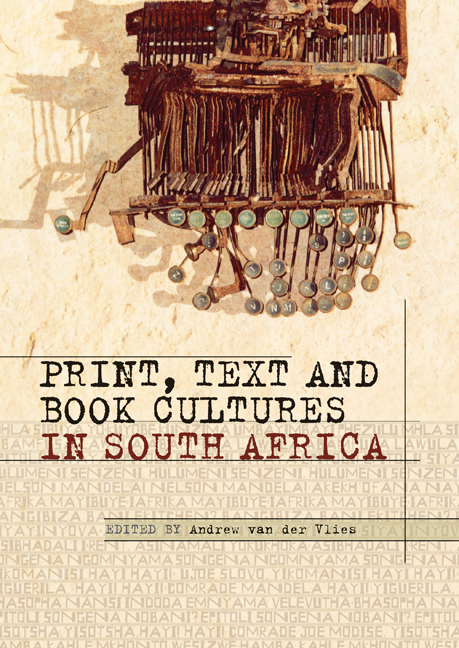Book contents
- Frontmatter
- Contents
- Acknowledgements
- Abbreviations and acronyms
- 1 Introductory
- 2 Print Cultures and Colonial Public Spheres
- 3 Local/Global: South African Writing and Global Imaginaries
- 4 Three Ways of Looking at Coetzee
- 5 Questions of the Archive and the Uses of Books
- 6 Orature, Image, Text
- 6.1 The Image of the Book in Xhosa Oral Poetry
- 6.2 Written Out, Writing In: Orature in the South African Literary|Canon
- 6.3 Not Western: Race, Reading and the South African Photocomic
- 7 Ideological Exigencies and the Fates of Books
- 8 New Directions
- Contributors
- Index
6.1 The Image of the Book in Xhosa Oral Poetry
from 6 - Orature, Image, Text
Published online by Cambridge University Press: 21 April 2018
- Frontmatter
- Contents
- Acknowledgements
- Abbreviations and acronyms
- 1 Introductory
- 2 Print Cultures and Colonial Public Spheres
- 3 Local/Global: South African Writing and Global Imaginaries
- 4 Three Ways of Looking at Coetzee
- 5 Questions of the Archive and the Uses of Books
- 6 Orature, Image, Text
- 6.1 The Image of the Book in Xhosa Oral Poetry
- 6.2 Written Out, Writing In: Orature in the South African Literary|Canon
- 6.3 Not Western: Race, Reading and the South African Photocomic
- 7 Ideological Exigencies and the Fates of Books
- 8 New Directions
- Contributors
- Index
Summary
Nwoma nko, nyansa nko.
Book knowledge is one thing, wisdom another.)
Akan proverbIsolated isiXhosa words were transcribed by explorers and shipwrecked sailors in the course of the eighteenth century, but the Xhosa language was first properly reduced to writing by Christian missionaries—J. T. van der Kemp in 1799 and, more systematically, John Bennie after 1821. Bennie in particular was well disposed to Xhosa oral traditions: an early reading sheet that bears Bennie's initials is sensitive to and exploits the Xhosa reverence for cattle, and he later attempted to see into print a legendary history of the early Xhosa chiefs dictated by Noyi Gciniswa (Opland & Mtuze 1994, 62–66). Bennie clearly had a sympathetic ear for isiXhosa, which he described as “a fine, soft, agreeable language, and uncommonly musical” (Shepherd 1955, 27), but some missionaries were less enamoured of its poetic qualities, less willing to seek an accommodation between Xhosa tradition and the technology of printing: as editor of The Kaffir Express, James Stewart, principal of Lovedale, wrote in 1871 that “[t]here is very little in old Kaffirdom worth preserving—and we think it will be the wisdom of the natives as soon as possible to move forward into day—and secure the blessings which the present time brings to them”, an attitude that led him later that year to reject for publication a Xhosa oral poem (izibongo) recorded at the circumcision ceremony of a chief's son on the grounds that
[t]he inducements to young men to forsake their education, and to leave their employments, for the ceremonies of circumcision are so many, that we cannot afford to place an additional one before them by throwing the halo of song and romance about the practice (Opland 1983, 204–7).
Despite the persistence of such attitudes, the nineteenth-century mission presses were on the whole eager to entice blacks into their literate world. The first isiXhosa periodical, Umshumayeli wendaba, published by the Wesleyans between 1837 and 1841, contained a charming dialogue composed by two schoolboys, Xelo and Joje, that deploys the imagery of oral tradition to assert the benefits of literacy and the superiority of books (Opland & Mtuze 1994, 68–71).
- Type
- Chapter
- Information
- Print, Text and Book Cultures in South Africa , pp. 286 - 305Publisher: Wits University PressPrint publication year: 2012



